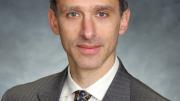Safra professor of economics Jeremy C. Stein, a specialist in finance, has been nominated by President Barack Obama to the Board of Governors of the Federal Reserve System. Stein has served briefly in the Obama administration: as a senior advisor to Treasury Secretary Timothy Geithner and on the staff of the National Economic Council from February to July 2009. Also nominated was Jerome H. (Jay) Powell, a lawyer and investment banker who served as undersecretary of the Treasury for finance under President George H.W. Bush, prompting speculation in the media that the paired appointments might help both men win Senate confirmation, unlike Obama’s previous nominee, Nobel laureate in economics Peter A. Diamond.
Stein joined the economics faculty in 2000; he was an assistant professor of finance at the Business School (HBS) from 1987 to 1990. In between, he taught at MIT’s Sloan School of Management, rising to Penney professor of management. (A Princeton graduate, he received his Ph.D. from MIT in 1986.) His website notes that his research interests have included behavioral finance and stock-market efficiency; corporate investment and financing decisions; risk management; capital allocation inside firms; banking; financial regulation; and monetary policy. He is a fellow of the American Academy of Arts and Sciences, a research associate at the National Bureau of Economic Research, and a member of the Federal Reserve Bank of New York’s Financial Advisory Roundtable. In 2008, he was president of the American Finance Association. If his nomination is approved, he will join two other Harvard affiliates on the Federal Reserve Board, Sarah Bloom Raskin, J.D. ’86, and chairman Ben S. Bernanke ’75.
The Harvard Crimson, in its coverage of Stein’s nomination, reported that his teaching has earned “sky-high Q Guide ratings.” The catalog entry for his spring 2010 course Economics 1759, “The Financial Crisis,” stated that it “provides a detailed examination of events in financial markets during the crisis period that began in August of 2007. Topics include: the housing bubble and mortgage markets, the role of the banks and the shadow banking system, policy responses by the Treasury and the Federal Reserve, and longer-run regulatory reform. The conceptual approach to these topics will draw heavily on recent research in financial economics.” According to the University’s current online course catalog, he is scheduled to teach a course at HBS this spring on “The Financial System in Extremis.”
Learn more about Stein in articles from the Harvard Magazine archives about:
- A February 2010 faculty panel analyzing the causes of the 2007-2009 financial crisis and the resulting near-brush with “Great Depression 2.0”
- A June 2010 news story on a book-length set of recommendations for reform of financial regulation by 15 economists, including Stein
- An October 2008 op-ed in the New York Times by Stein and Converse professor of finance and banking David R. Scharfstein
- A September 2008 op-ed in the New York Times by Stein and University of Chicago economist Anil Kashyap








